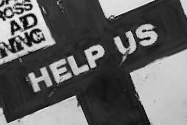 On Part I of our last article we addressed the other hidden crisis: the institutional, in this Part II we ´ll be focused on international regulation (IHL) and their impact on humanitarian sector aid delivery, that urges organizations like ICRC to make in-depth changes and enter in an adaptation process. The solutions for both crises get to the same point: an important change on institutional culture, principles and approach of aid delivery.
On Part I of our last article we addressed the other hidden crisis: the institutional, in this Part II we ´ll be focused on international regulation (IHL) and their impact on humanitarian sector aid delivery, that urges organizations like ICRC to make in-depth changes and enter in an adaptation process. The solutions for both crises get to the same point: an important change on institutional culture, principles and approach of aid delivery.
War conflicts are not the same as in the past, not the same practices or technologies, hence it could not hold the same regulation under threat to become obsolete.
New challenges and forms of war shows that Geneva conventions go in a negative parallel to war situations transforming humanitarian aid on inefficient and in many cases inaccessible.
The current international humanitarian law has become vulnerable because …
“… the principal cause of suffering during armed conflict is not a lack of rules, but rather insufficient respect for the applicable rules. IHL currently lacks effective means of identifying, preventing and halting violations while they are occurring…” [1]
Is it widely accepted that there is an extensive regulation framework but if there is not applicable, means that need to be changed. In this new reality of constant violation of war rules is imperative to be updated and adapted.
Reinforce mechanisms of control and strengthen work with national societies & governments constitutes the only path to assure – or at least improve- respect of IHL. Is it here another reason that we identify for abandoning the idea of being adjunct organizations but to be part of the whole State apparatus. The commitment and involvement that being “part” represents, helps on the path of not be seeing as an “outsider” of the conflict but and organism that belongs to both parts equally. The creation of strong links with stakeholders in the conflict is what would prevent from violations.
The principle of neutrality is key in the conflict; by the contrary the principle of independence is what is generating distrust, undermining their legitimation. Built confidence is not just a matter of aid delivery but political commitment and being identified as one more part in the conflict, although a neutral part.
Currently ICRC is not seems to be institutionally prepare to face this new challenge, but starting by changing institutional culture is possible. With the passage of time the failure on the fulfilment of war regulation will get worse as war stages become more conflicting and extremist.
A globalize world has brought new political and social patterns of behaviour that had a deep impact on war conflicts that demands new solutions under different approaches of managing humanitarian aid. This new political map, do not necessary represent a negative impact but force to address this challenges by driven change through new principles of adaptation and implementation on aid delivery itself.
“…States should review, and where necessary, revise their domestic normative frameworks to prevent or mitigate obstacles to the safe delivery of health care that may arise during violence and armed conflict. The ICRC is currently developing a set of practical and concrete recommendations to this end..”. [2]
The role of ICRC should be within the government; recommendations are not enough if the focus is on the implementation. In addition, the level of conflict that nowadays those countries face make the State absolutely overwhelm but their impact, in which domestic normative could only be applicable if there is a determinate and strong political will of both parts of the conflict.
Just to use experience and technical knowledge to prevent or mitigate obstacles for a safe delivery is not enough. A full insertion of the aid organization in the conflict is urgently needed, through a strong work of conciliation and diplomacy. Is good to highlight that a lack of IHL applicability is also a lack of confidence on the humanitarian organization itself, hence a break on legitimacy.
Is time for mainstreaming humanitarian action into the government system and be an organization that is clearly identified as serving all parts in the conflict. Is in that sense that the response for both crises: institutionally and on applicability of humanitarian law, is basically the same.
